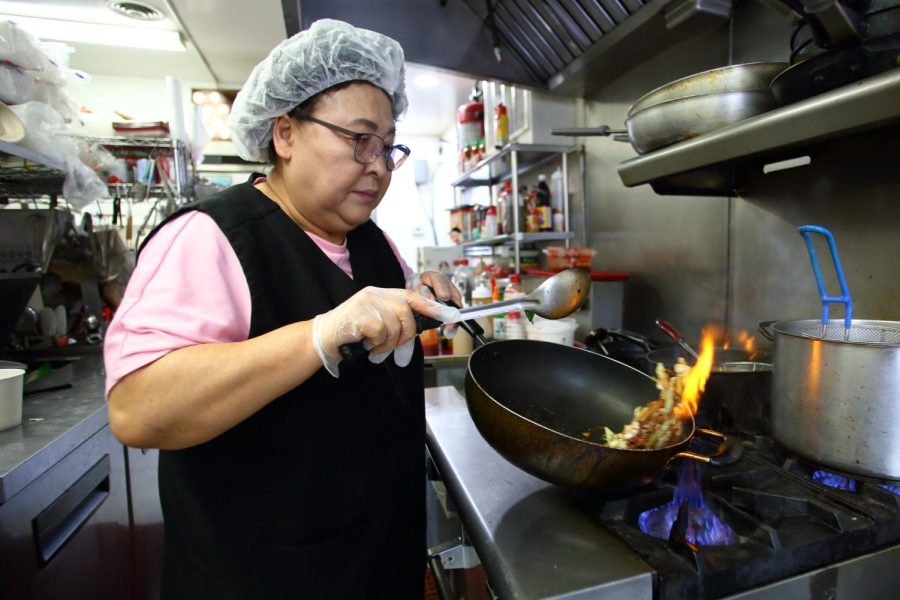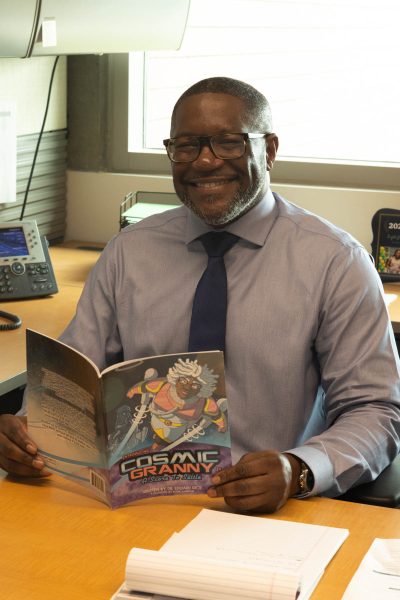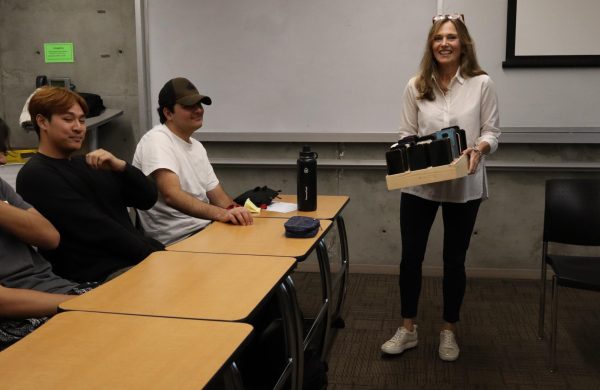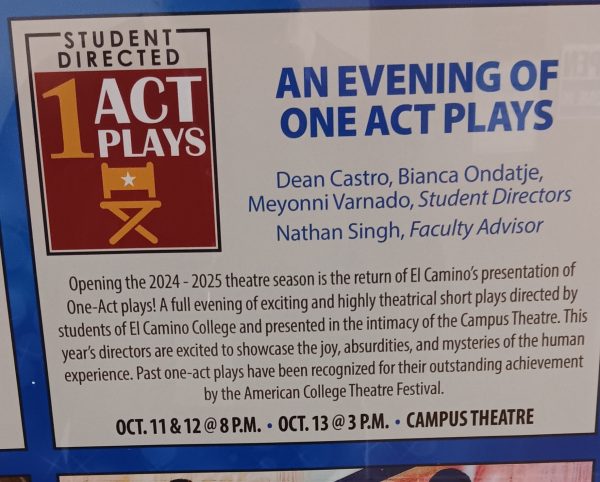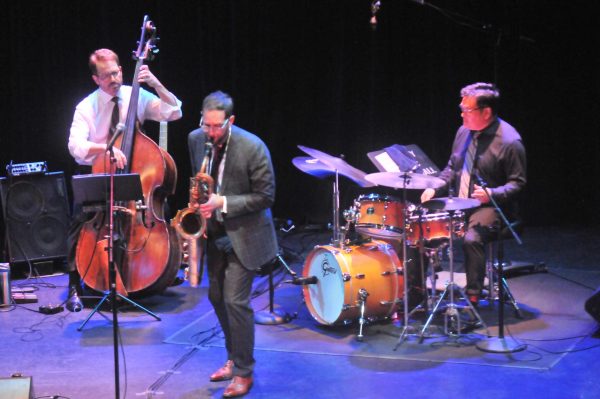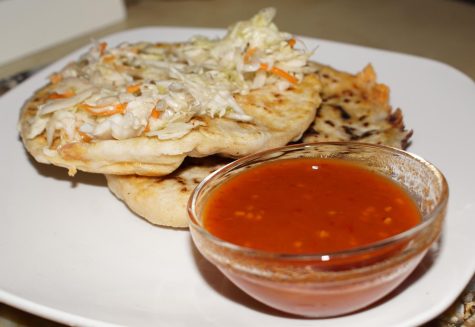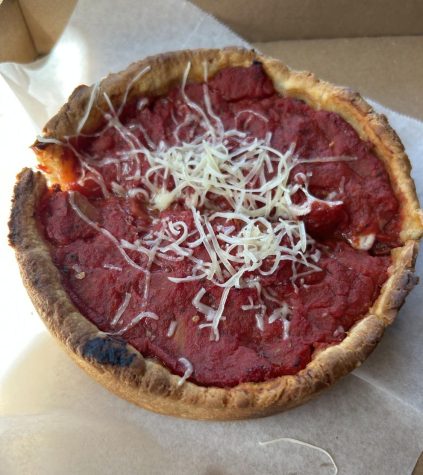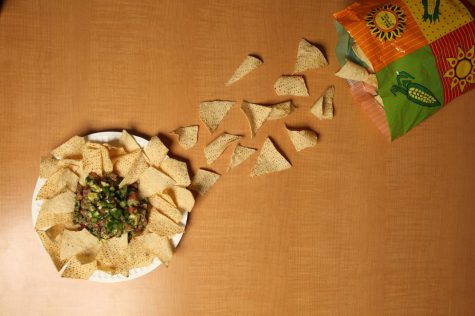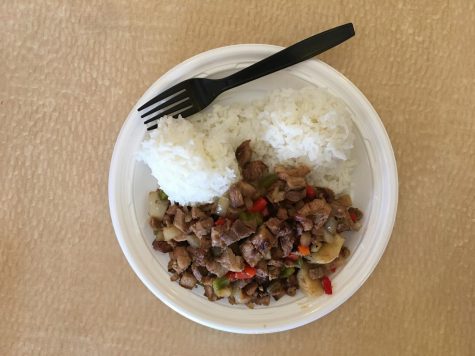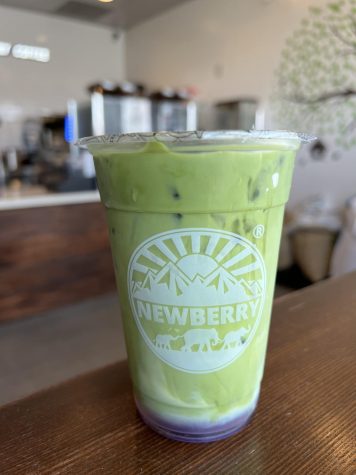Their Japanese restaurant closed during the pandemic; now they’re back with a new Korean twist
Kyong Yu, owner of the Korean-themed restaurant Mr. H’s Lunch Place, tosses a wok of food into the air as she cooks a meal for her workers in Gardena. (Raphael Richardson | Warrior Life)
Across the street from El Camino College, in a compact restaurant nestled inside a former motel-turned-office building, a woman steadily churns out scratch-made Korean food in her kitchen.
That woman is Kyong Yu, whose anglicized name is Jennifer (Jenny for short), the owner of Mr. H’s Lunch Place, a Korean restaurant catering to ECC students. And right now, she’s busy making meal after meal for a special client — GrubHub. They have sent a photographer to take photos of Yu’s food to use on their mobile ordering app.
At 3 p.m., the restaurant is otherwise not busy — save for an El Camino instructor and a few of his students waiting to pick up their orders of Korean cuisine.
The restaurant is at its busiest in the beginning of the week, when most students are at the college. The flow of students into the restaurant peaks around noon, when most take their break and slows as the day progresses and they begin leaving for home or work. By Friday, the restaurant is usually quiet.
Soon, the blitz of plates going to and from the kitchen stops as the photographer finishes getting shots of the food. “You’re faster than like, 90% of the restaurants I work with,” he says. Yu gives him a bag with two meals to take home before he leaves.
Yu is a chef at heart. Born in South Korea, she moved to the United States with her husband and owned and managed a few restaurants and stores across California. Eventually, she began to work at a new Japanese restaurant in Gardena – Wasabi Sushiya.
The tale of Wasabi Sushiya is a complicated one that leads right back to the same spot – a new restaurant, Mr. H’s Lunch Place, in the same location that honors a man who worked right across the street at El Camino College.
That man is Hiram Hironaka.
Hironaka, known to both El Camino employees and students as Mr. H, was the college’s automotive technology instructor. Originally an automotive instructor in the 1970s at the since-closed Buchser High School in the Silicon Valley area, Hironaka joined El Camino to teach automotive technology in September 1983, eventually becoming a tenured professor before retiring in 2015.
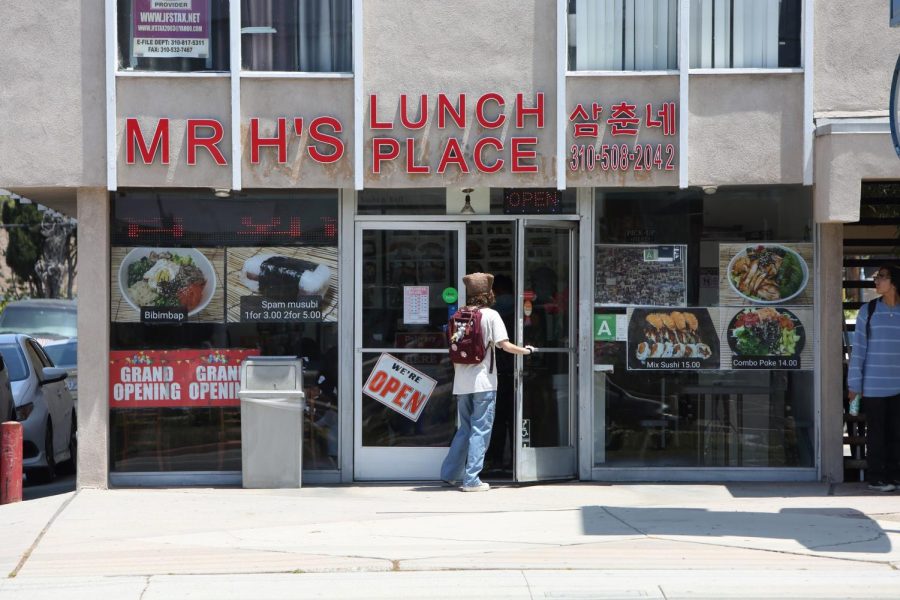
With a passion for his students, Hironaka decided to open up a low-cost restaurant for students to go, and the perfect spot was just a crosswalk away from campus.
“My goal was to provide good food that was reasonably priced, and healthy fresh food for the kids,” he says. “Out of love for the kids and everything. My heart felt good – my pocketbook didn’t.”
Today, he pulls his car up close to the front doors of the restaurant, coming in with a bag of lemons for the restaurant and a ukulele for himself. He’s dressed simple – a gray T-shirt with a black and white stripe going through the middle, a pair of camouflage shorts and a pair of square-shaped glasses. A leg brace gives him a slight limp as he walks into the store. The many wrinkles on his face account for the numerous years of experience as both a professor and restaurateur.
“I thought it would be a good idea to branch out into the food industry,” Hironaka says as he takes a seat in the restaurant. He checks in on both Yu and the restaurant itself every Friday.
Being a professor while running a restaurant across the street from the campus where he worked was not an easy job, Hironaka says.
“Basically what I would do is I get to teach, and then I will come here, eat, go to the backroom and sleep,” he says with a laugh.
Despite not working at the restaurant anymore, he still comes into the restaurant for Yu, who runs Mr. H’s with the help of a few employees.
Often working in the kitchen, she dons an apron that adorns whatever shirt she chooses that day. She wears a hair net that covers her short, wavy black hair, and black glasses with blue accents.
Her old age means she takes her time walking across the restaurant, but she is lightning fast with her cooking and to the point with her words like every sentence is a business proposal.
“I used to have [a] husband,” she bluntly says, “but he died.”
Yu keeps her backstory relatively short. She would rather focus on the restaurant.
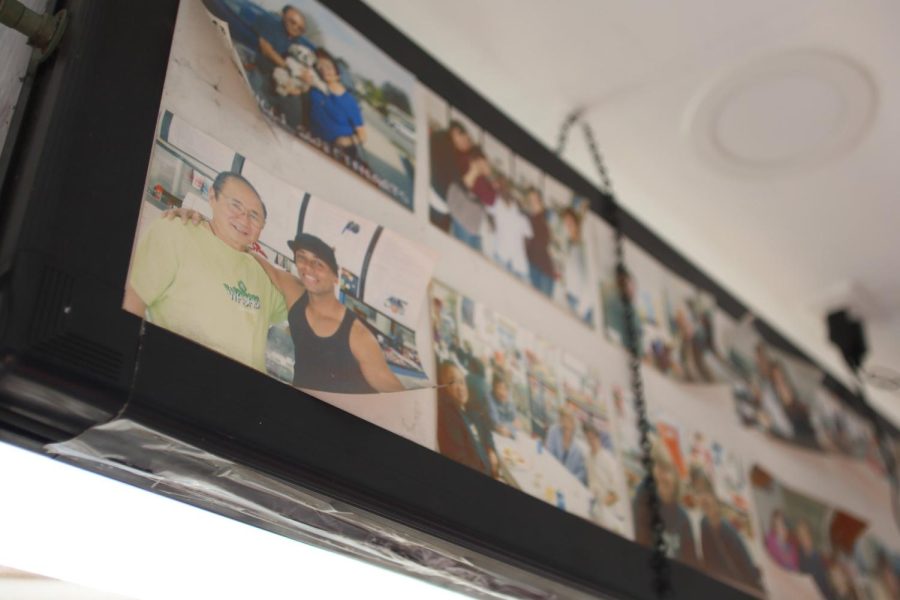
As with any locally-owned business, Yu has not had it easy running Mr. H’s, and neither did her predecessor Hironaka with Wasabi Sushiya.
Business with the new restaurant was fine — until the Great Recession in 2008. Around the globe, the economies of nations slowed in what the International Monetary Fund said was the most severe economic collapse since the Great Depression in 1929.
As the U.S. housing market collapsed and banks and corporations fought to get by, Wasabi Sushiya struggled to stay afloat.
“There was a downturn in the economy in this local area,” Hironaka says. “We took a hit.”
However, unlike many small businesses at the time, Wasabi made it through the 2008 recession relatively unscathed. The business, at the time, was still intact.
For the next few years after the Great Recession, Wasabi Sushiya was getting by. Besides some problems with gas bills that were resolved, nothing was really standing in the way of the small Japanese restaurant.
That was, until 2020 came around.
And when 2020 came around, so too did COVID-19.
“It ruined us,” Hironaka grimaced. “All of a sudden people couldn’t eat inside, people were afraid of coming in.”
The pandemic figuratively and literally shut down the global economy. Lockdowns and virus outbreaks among shipping workers caused global supply chains to come crashing to a halt. This, in turn, wreaked havoc for retailers, and in particular, small businesses, like Wasabi Sushiya.
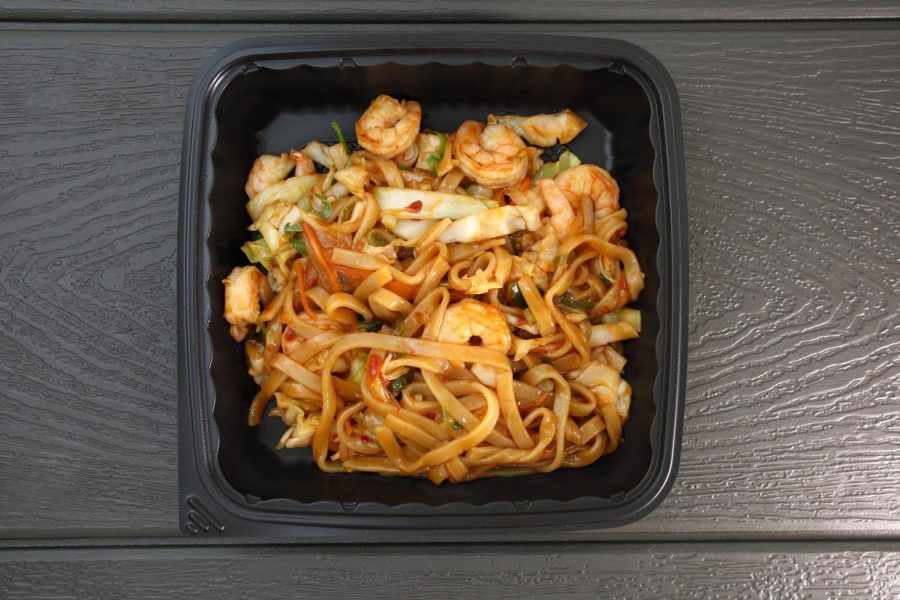
The pandemic did not spare anyone and any business. Julie Clowes, the director of the U.S. Small Business Administration’s L.A. District Office, says that the lockdowns affected virtually every sector of business.
“You can say… that pretty much every business was affected in some way, shape or form,” she said. “Obviously certain industry sectors had a much harder hit and were much slower to come back. I think of something like the hospitality sector, where the businesses had to shut down and they didn’t really have … another avenue [of revenue].”
The SBA is a federal agency designed to support small businesses with anything from loans, to business advising, to disaster relief. With the pandemic being considered a disaster, it put a heavy strain on the agency as it struggled to deal with the flood of requests from restaurants desperate to stay open.
“During the height of the pandemic, we had four different programs running simultaneously … so the one [program] everyone thinks of is the RRF, or the Restaurant Revitalization Fund,” she said. “That certainly reached a lot of restaurants, although we had a greater demand than we had supply of funding, unfortunately.”
The SBA reported that they dispersed almost 16,000 grants, totalling around $5.7 billion in aid, but it was not enough to stop the closings.
The slow march of death for thousands of restaurants across the country began, with the National Restaurant Association reporting around 90,000 of them permanently closing their doors by May 2021.
For Wasabi Sushiya, which had weathered the 2008 recession, the pandemic would soon prove to be its breaking point.
Unlike the 2008 recession, COVID hit the restaurant hard. A multitude of problems began piling up against the restaurant. Just a year before, construction projects for the soon-to-be Administration Building left the entire east side of campus bordering Crenshaw Boulevard closed, barring students from going to Wasabi Sushiya.
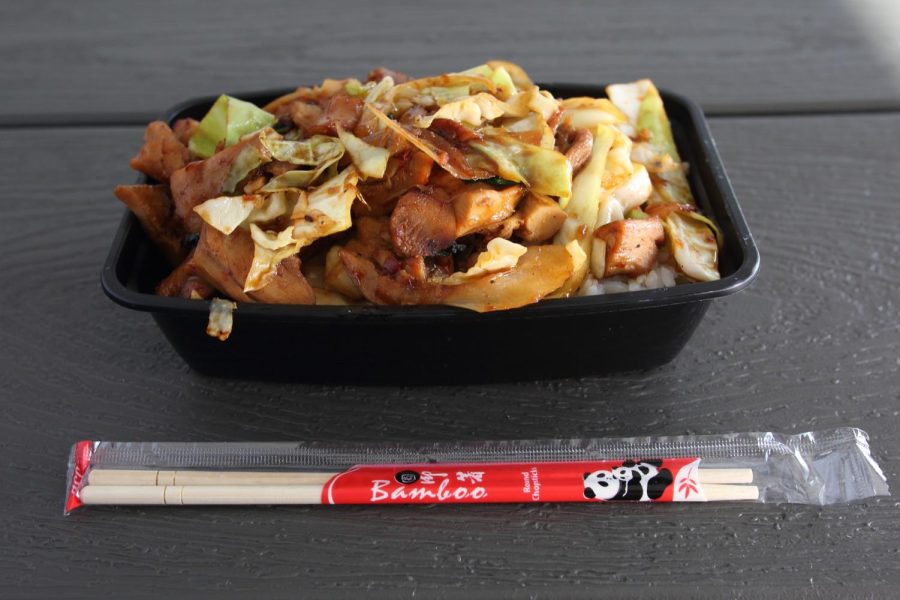
“They had fenced off the whole front, from Manhattan Beach Boulevard all the way down to Redondo Beach,” Hironaka says. “Automatically, we can see that it became a barrier … we put up with that for one whole year.”
That following year, 2020, Hironaka opened the business back up, only for his prospects to come to a crashing halt when the lockdowns were enacted on the state and federal levels, closing his business again.
As he struggled to deal with the lack of customers, he, like many other business owners, kept his employees on payroll, paying their salaries out of pocket.
“I felt that I needed to keep them afloat, too,” he says.
The situation Hironaka was in became too much for him to handle. He was hospitalized in late 2021 and handed over the reins of the restaurant to Yu. But despite her efforts, the restaurant shut down, with the company’s Instagram announcing the closure in the middle of December, two days before they shuttered.
“2021, December 17. We shut down,” Yu says. “I tried to reopen [in] May, but we had a lot of problems.”
It was at this time that they decided to rebrand the restaurant altogether. Yu had one person in mind when it came to the name of the restaurant — Hironaka. Having supported her the entire time she has been at Wasabi, Yu wanted to give back to the man that had supported her for years.
“He doesn’t even make one penny, he is just trying to support me,” she says. “I really appreciate it. I want people to remember his name – ‘Mr. H’s Lunch Place.’”
Out of the ashes of Wasabi Sushiya, Mr. H’s opened on Aug. 15, 2022, days before the fall semester started.
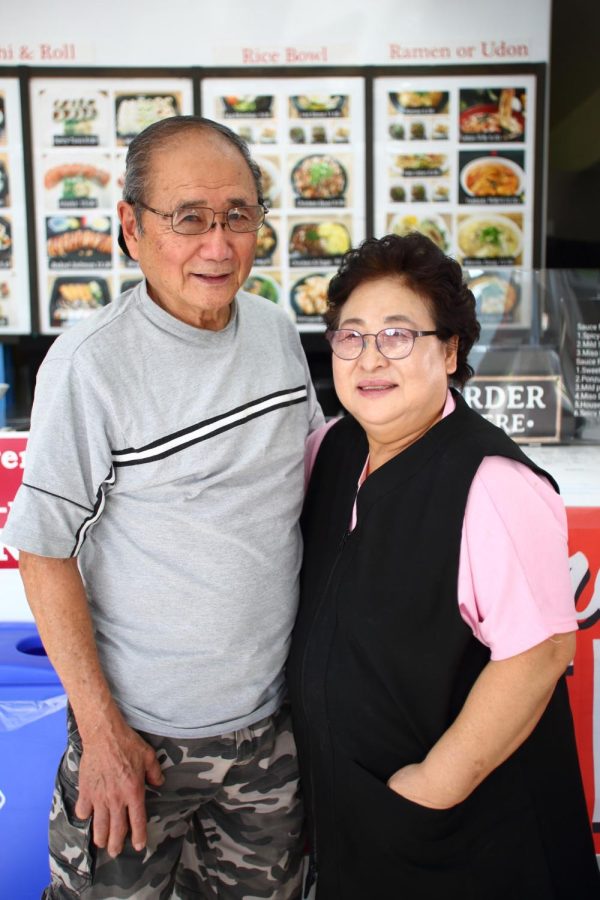
Back in the kitchen, Yu cleans the mess left over from the GrubHub order and begins making a smaller and simpler meal for her workers – a hearty dish of chicken and vegetables.
“It’s cheap to make,” she quips as she prepares the meal.
She starts by dumping a small bag of pre-cut chicken into a wok, a cooking pan common in Asian countries. After letting the meat cook through, she pours in a mixture of chopped cabbage, carrots and soy sauce, letting the new ingredients sizzle against the piping hot pan.
Letting the mix sit in the pan, she reaches over for a bottle of hot chili sauce. She pours the red ketchup-like sauce into a large spoon, dumps it into the wok and tosses the mix several times, causing the flame of the grill to flare up.
In a few short minutes, she’s done cooking. She takes it over to an awaiting plastic container, and plates up the steaming hot food to be eaten later.
She then whips up a small plate of salmon for Hironaka before sitting down at the bench to discuss the future of Mr. H’s.
As of now, Yu says, they aren’t sure of what’s going to happen.
“We don’t know,” she says with a chuckle. “Maybe one day I die, we don’t know.”
While they enjoy running the restaurant and don’t want to stop, they don’t plan on running it forever. When the time comes for Yu to retire, they have plans on selling the restaurant.
“It would be great to have somebody take over so that we can continue the tradition of providing good food for the kids at a reasonable price,” Hironaka says. “That’s what I would look for in a buyer.”
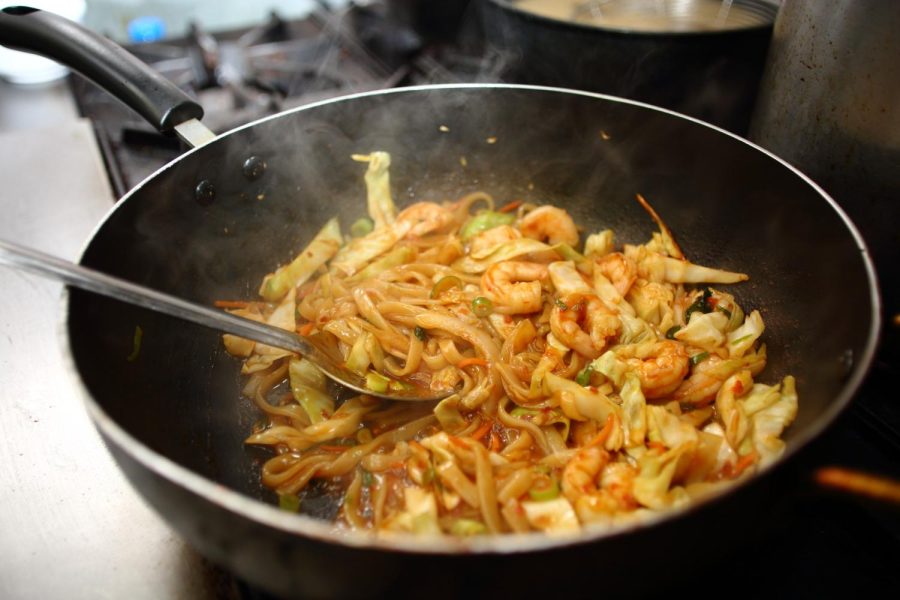
Editor’s Note:
- Photos were enlarged on Friday, June 16.


